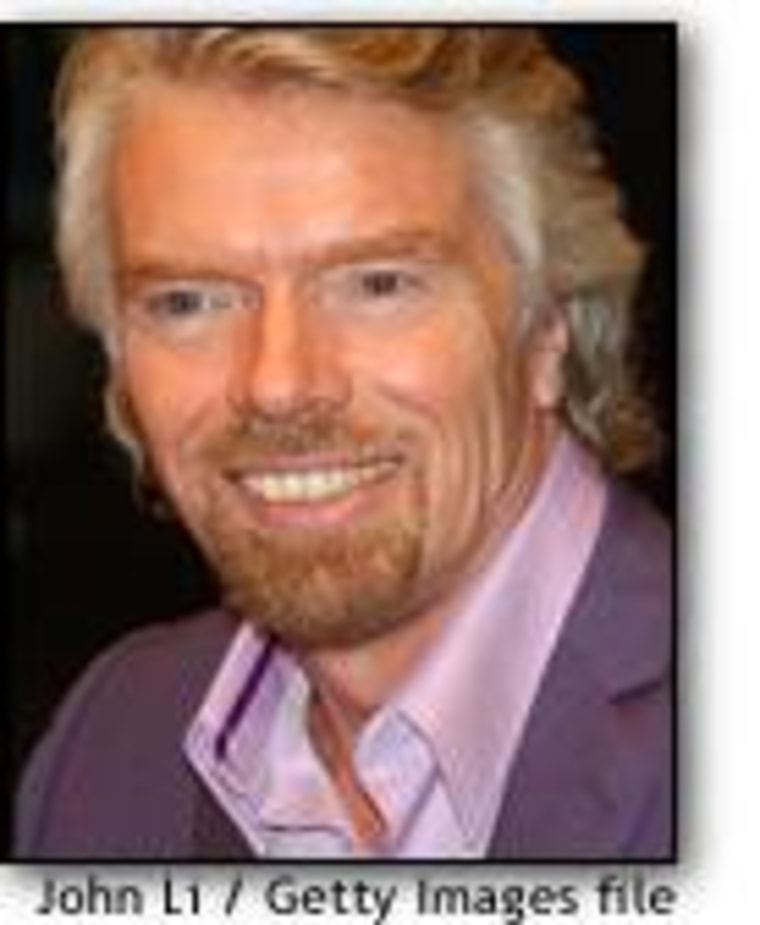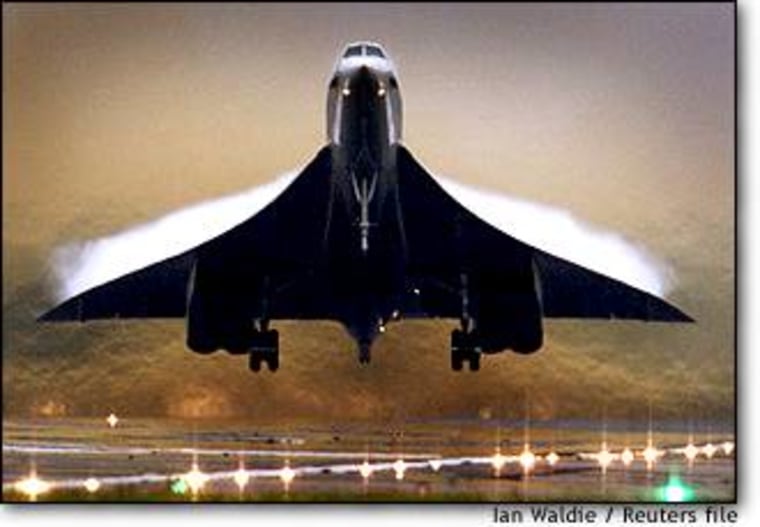Unless Virgin Atlantic founder Sir Richard Branson can persuade the British government to force his hand, it seems unlikely his plucky airline will have the opportunity to fly the Concorde when British Airways ends its supersonic service this fall.
Branson, the British billionaire entrepreneur who has reveled in his role as a perennial fly in the ointment of flagship carrier British Airways, suggested earlier this month that Virgin might be willing to take over the Concorde routes if he could buy the British Airways fleet of seven supersonic jets at the original purchase price of 1 British pound ($1.57 U.S.) per plane.
Otherwise, the handful of planes, which cruise at just over Mach 2, about 1,350 mph, are set to become museum pieces.
Virgin Atlantic, now majority owned by Branson’s Virgin Group PLC with Singapore Airlines holding 49 percent, has persistently lobbied for a chance to take over the supersonic service, which whisks passengers in three-hours across the Atlantic complete with decadent meals and champagne.
Virgin believes its lower cost structure for ground operations and across its flight schedule may open a window to profitability. While British Airways operates like a standard network carrier — with a vast network of destinations, many of which are not profitable — Virgin has usually hand-picked its routes to maximize per-seat revenue.
But they have said they will need BA to reveal its Concorde operating data to ensure that it’s possible to make money on the route. Given the short timeline to get a successor service running — and the bitter longtime rivalry between the two — Branson’s odds are growing longer by the day.
“We would need enough time to actually make it feasible,” said Virgin spokeswoman Anna Burdsall. “If we don’t receive anything from them, Richard was considering asking the government if they could do anything to intervene.”
Museum pieces
British Airways has been quick to counter that the jets would be headed straight to museums and the history books, securing its place as one of three airlines to have its livery painted on the supersonic plane. “They’ve been told very clearly it’s not for sale,” said Richard Goodfellow, a spokesman for the airline.

Air France has operated the remaining five Concordes still in service, though its service may end as soon as May 31 and the planes will be decommissioned in October. (Branson reportedly also tried to buy their fleet, without success.)
Perhaps ironically, Virgin co-owner Singapore Airlines once had its colors on the side of the Concorde when it operated joint flights with British Airways. And U.S. carrier Braniff, which later went bankrupt, flew subsonic flights of the Concorde between Washington, D.C., and Dallas in 1979-80, but abandoned it when flights were mostly empty.
And while most travelers know the Concorde for its transatlantic crossings between London, Paris and New York, it is also operated on special flights to Barbados.
Concorde operating costs have always been steep, and it is far from clear that Branson could make a go of it even with Virgin’s lower costs.
A fully-fueled Concorde — with a range of about 3,700 miles — takes about 30,000 gallons of fuel, which is what it would take for a 747-400 to fly for 7.5 hours, approximately the time needed to cover the same distance. The Concorde, of course, flies over twice as fast. Based on average fuel costs in both the United States and Europe, a Concorde with 80 of its 100 seats filled would cost each passenger some $430 in fuel alone; a 75 percent-filled 400-seat 747 would cost each passenger about $106 for the same trip.
Overall operations costs are far beyond that — especially its ever-growing maintenance needs. The newest Concorde first entered service 24 years ago, and the technology is well over three decades old. With a worldwide fleet of just a dozen. replacement parts must be custom-crafted and crews must be specially trained.
Still, the stratospheric cost of a Concorde ticket usually far outweighed those costs. A full-fare round-trip ticket costs more than $13,000, and flights were renowned for their regular manifests of celebrities and power brokers.
“The marginal cost of operation was, until not too long ago, more than covered by the revenues,” said Aaron Gellman, management professor at Northwestern University’s Transportation Center.
Everything changed with the drop in traffic after the Sept. 11, 2001 attacks and the July 2000 destruction of an Air France Concorde during takeoff from Paris. Concorde flights were suspended for 16 months while the aircraft were upgraded with tougher fuel tanks and tires.
The two events left both fleets of Concordes facing ever-steepening losses. Air France chief Jean-Cyril Spinetta said his airline’s flights, which were only 20 percent filled, cost it 50 million euros, with similar red ink expected in the future. As it is, British Airways already faces a $130 million write-off this year by abandoning the Concorde, mostly in spare parts and its 100-person maintenance staff.
British Airways’ pain of losing Concorde from the fleet may be soothed by the glory of having flown it for a quarter-century as an emblem of luxury and space-age achievement. They have already been deluged by hundreds of requests from museums and collectors, all eager to have a Concorde as a centerpiece exhibit. They’re still reviewing them.
“When you’ve got seven to go around, some people will be disappointed,” Goodfellow said. “But we haven’t named names as yet.”
It also stands as the latest counterassault to Branson’s endless poking at British Airways’ stature. He has consistently portrayed his 19-aircraft fleet as David to British Airways’ 343-aircraft Goliath, including a fierce lobbying effort against a proposed 1996 alliance between the British flagship carrier and American Airlines that included painting the sides of some Virgin jets with “BA/AA No Way.” The deal was eventually scuttled by regulators, though it was partially revived with the larger oneWorld alliance. He also won a lawsuit against British Airways for interfering with Virgin’s early operations, even trying to steal passengers from its ticket counters.
Virgin’s bid for the Concorde seemed custom-tailored to get under the skin of executives at British Airways — not only with the purchase price and demands for access to the Concorde’s books, but also with a request to get the jet’s lucrative gate slots from New York’s Port Authority and BAA, the British airport operator.
For its part, British Airways insists the government has no right to interfere in Concorde ownership issues — despite the unusual purchase price, which France and Britain used to essentially force the planes on their national airlines after development costs spiraled into the billions and economists warned the planes would never make money. It argues the millions spent in maintenance and upgrade costs over the years — including a $110 million upgrade after the Paris crash — more than make up for the original purchase.
Battle over Baghdad
Branson seems undeterred. Even as he was bidding for the delta-winged planes, he began another broadside on British Airways: announcing plans to start regular flights to Baghdad. British Airways responded by waving a treaty with Iraq that had allowed it to operate flights from London, which last flew in 1987. Branson said he would begin with 747 flights to bring aid into Iraq, but Virgin was also planning for regular service, presumably to serve a lucrative market of public officials, aid workers and expatriates eager to return. The British government may have to resolve that skirmish as well.
The overall pattern sends a deeper sort of message that Branson — never one to shy away from blunt talk and public spats to conduct his business — wants to give Virgin a real shot at premium routes and service.
“Richard Branson started out catering to the backpackers, we used to call them,” Gellman said. “This is a real change of focus.”
